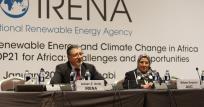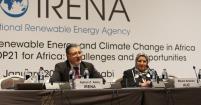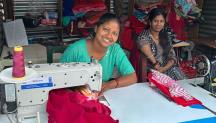

AU Commission, IRENA Call for Coordination on Africa’s Energy Transition
Newsletter
The African Union (AU) and IRENA on Friday briefed African energy ministers and other senior officials on outcomes of the Paris climate talks and the need for renewables to address climate change.
Indigenous renewable energy sources could more than match Africa’s fast-growing energy demand without adding to global carbon-dioxide emissions. Off-grid solar, wind and bioenergy installations are also helping to extend modern electricity services across the continent.
Yet renewable energy projects still face challenges in attracting large-scale finance and investment.
“People and productive activities suffer from an energy deficiency, despite the availability of resources far exceeding current energy demand.” – Elham Ibrahim, African Union Commissioner for Infrastructure and Energy
December’s landmark Paris Agreement, however, has tipped the balance in favour of accelerating renewable energy development. The 21st Conference of Parties to the United Nations Framework Agreement on Climate Change (COP21), underlined the need to cut emissions, especially in the energy sector, starting immediately.
Governments, companies and organisations have resolved to work together to keep the average global temperature increase within a limit of 2 degrees Celsius this century. Doubling the share of renewables in the global energy mix is enough for half of the necessary emission reductions, with improved energy efficiency achieving the rest.
Developing and emerging countries need sustainable ways to power their growing economies in the decades ahead. Renewable energy technologies offer chances for job creation and local economic development at the same time as avoiding emissions.
“We can transform Africa into a green-growth and low-carbon economy, thereby contributing significantly to the global climate-change agenda.” – Dr. Elham Ibrahim, African Union Commissioner for Infrastructure and Energy
She stressed the importance of co-ordinating pan-African and international initiatives. Participants reviewed a mapping exercise that involved “stock-taking and gap analysis” on the continent’s existing renewable energy initiatives and action plans.
“This is really a moment of opportunity for Africa. We need to understand how international public finance will flow after COP21. And we have to have co-ordination in Africa to ensure this brings maximum benefits to African economies.” – Adnan Z. Amin, IRENA Director-General, whose home country is Kenya
Even before the Paris talks, falling technology costs put renewable solutions within reach for countries of all sizes and economic types. But climate targets call for rapid investments on a massive scale.




